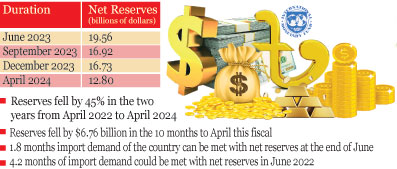Reserves falling continues Net reserves now $12.8 b
Zarif Mahmud: At the end of last April, Bangladesh’s net international reserve (NIR) fell to $12.8 billion according to the International Monetary Fund’s (IMF) Balance of Payments or BPM-6 system. At the end of June 2023 which was $19.56 billion. According to that, the net reserve decreased by $6.76 billion in 10 months.
Last Monday, the IMF approved the third installment of the loan waiver in favor of Bangladesh. Immediately after this, the organization published an evaluation report on various aspects of Bangladesh’s economy. This information came out in that report.
According to the report, Bangladesh has fulfilled all the conditions except meeting the target of foreign exchange reserves till last December. According to the IMF’s accounting system, the net foreign exchange reserve target was $17.78 billion by December last year. At that time the net reserve of Bangladesh was $16.73 billion.
It also said that at the end of the fiscal year 2023-24, the Gross International Reserve (GIR) of Bangladesh will stand at $18.98 billion, with which 2.3 months of import expenses can be met. At the end of June 19, gross reserves were $19.52 billion. However, the availability of the third tranche of the IMF loan will increase the reserves slightly.
Meanwhile, at the end of the current financial year, the net reserve may stand at $14.78 billion. This amount will be able to cover 1.8 months of import expenses with this amount of reserves, the report highlighted. Whereas two years ago in June 2022, net reserves were $28.41 billion. With that amount of reserves, 4.2 months of import expenses could be met. And with the net reserves of 2023, 2.9 months of import expenses could be met. That is, the import capacity of Bangladesh is gradually decreasing.
According to the report, despite meeting many conditions, Bangladesh could not meet any of the quarterly target of reserves set by the IMF after the start of the loan program. After repeated failures, there were fears that the third installment would be funded. However, following Bangladesh’s request, the IMF delegation lowered the reserve target last month. But fulfilling that too has become challenging for Bangladesh.
The net foreign exchange reserve target set by the IMF for Bangladesh as of June 30 this year was $20.11 billion. However, in view of the application of Bangladesh, it has been reduced to $14.75 billion.
Earlier, at the end of last September, the target of maintaining net reserves was $17.99 billion. However, Bangladesh failed to preserve the reserve even at that time. At the end of September last year, net reserves stood at $16.73 billion.
Meanwhile, from April 2022 to April 2024, two years from April 2024 to April 2024, the IMF has presented the picture of reserve conservation of 9 countries. It can be seen that the reserve has decreased the most in the last two years in Bangladesh. In addition, the reserves of Thailand and the Philippines have decreased slightly. At the same time reserves increased in Brazil, India, Malaysia and Mexico. Meanwhile, the reserve positions of South Africa and Indonesia were unchanged.
Analysis shows that from April 2022 to April 2024, the reserves of Bangladesh have decreased by about 45 percent. During the same period, Thailand’s reserves fell by only five percent and the Philippines by three percent. However, neighboring countries India’s reserves have increased by about five percent and Mexico’s by about 10 percent. Other countries’ reserves rose slightly.
According to the report, the economy of Bangladesh is facing multifaceted challenges. Bangladesh’s macroeconomic crisis has increased due to consistently high prices of goods in the world market and reduced flow of money in the global financial sector. Although the current account has contracted, the sudden financial account deficit has put pressure on foreign currency reserves and exchange rates. However, bold steps have been taken to correct the currency exchange rate to deal with this pressure.
The average inflation in FY 2023-24 is likely to be 9.4 percent. In the next financial year, it may come down to 7.2 percent, the IMF has projected. The IMF believes that inflation may come down due to policy continuity and the possibility of lower commodity prices in the global market. However, the organization believes that there will be uncertainty in the economy despite the various measures taken by the government. In addition, it has been projected that the total domestic production i.e. GDP growth in the current financial year will be 5.4 percent. However, it may increase to 6.6 percent in the next financial year.
It also said that in the medium term, if the exchange rate and other policies work properly, expansion and diversification of export earnings and attracting foreign investment, the net reserve will increase to $19.47 billion by the end of the next financial year and may increase further by the end of the 2025-26 financial year to$27.95 billion. Through this, Bangladesh’s import expenditure can be met for 2.1 months and 2.7 months respectively.
Rare Israeli airstrike in Beirut kills Hezbollah commander and more than a dozen others
International Desk: Israel launched a rare airstrike that killed a senior Hezbollah milita…








